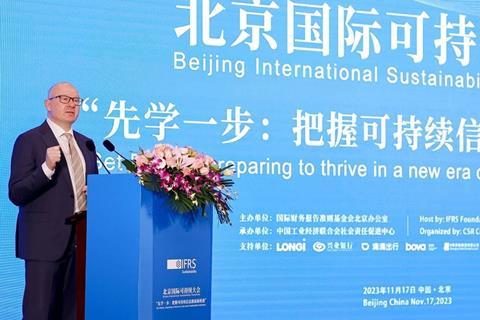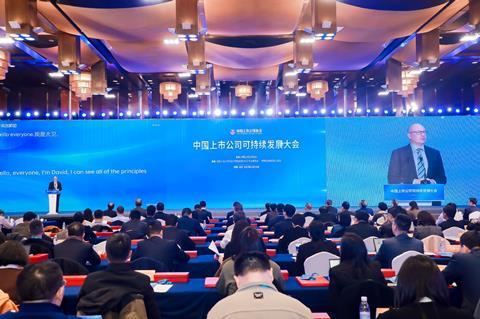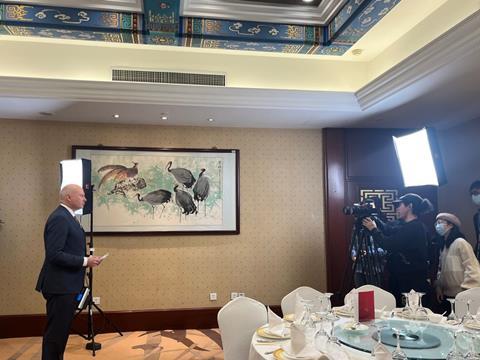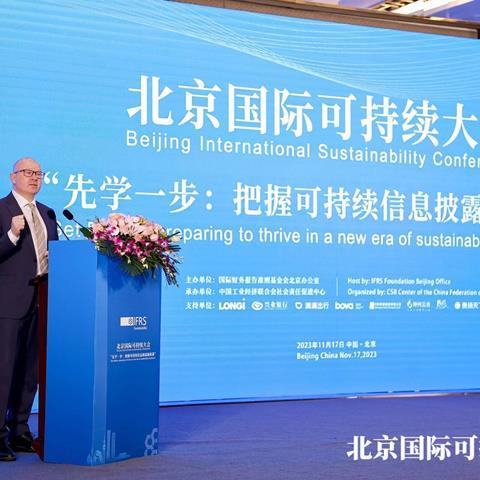By David Atkin, CEO, Principles for Responsible Investment

At the PRI, one of our key strengths is the diversity of our global signatory base, and as CEO I’ve made it a priority to visit many of our signatory communities around the world. Last week I added China to that list, with a packed three-day visit to the nation’s capital, Beijing. Expertly supported by PRI’s Head of China, Nan Luo, and her team, I was delighted to have the chance to engage with key asset owners, policy makers, and some of our leading signatories in the market.
The growth of responsible investment in China
China has been one of our fastest-growing markets globally in recent years, and since establishing our Beijing office in 2017 we have welcomed many of the leading Chinese investors into the PRI. Notably, we have penetrated nearly half the AUM of China’s insurance sector, with four of the largest insurance companies having joined us.
Responsible investment (RI) is attracting positive attention in China’s national media outlets too – during my visit, I contributed to an interview with Caixin and took part in an RI-focused segment on China Central Television (CCTV). In the interview, I commented that ESG disclosure and practices could play a role in contributing to China’s bilateral trade and investment flows with other countries, as international investors are increasingly assessing companies’ sustainability-related information.
There is clearly growing understanding from regulators, associations and listed companies about the value and benefits of ESG disclosure.
Further progress is being made on the data disclosure front locally, too. For Chinese companies, the availability and quality of sustainability reporting varies considerably, so it’s encouraging to see that the ISSB Standards have achieved recognition from the market. I was very pleased to speak to a combined audience of 700 representatives from investors, listed companies and industry stakeholders across the ISSB’s Beijing International Sustainability Conference and the China Listed Companies Sustainable Development Conference, organised by the China Association for Public Companies (CAPCO). At both events, I shared our support for the ISSB Standards and our call for policymakers to begin to adopt them into law on an economy-wide basis by 2025. It’s important for regulators to set a timeline to help create certainty for investors, and drive companies’ readiness to deliver on sustainability-related disclosure.

There is clearly growing understanding from regulators, associations and listed companies about the value and benefits of ESG disclosure. It was good to hear from the Deputy Director-General of the China Securities Regulatory Commission, Guo Jun, that the Commission is in the process of guiding the Shanghai and Shenzhen Stock Exchanges to develop sustainability information disclosure for listed companies, as part of a staged approach to progressing sustainability disclosure.
An encouraging policy landscape
More broadly, these developments are supported by an encouraging policy landscape. China is moving steadily forward with policy and regulatory reforms designed to better align its financial sector with national sustainability and carbon neutrality objectives, and at the level of the wider economy, the government has now put in place a comprehensive policy framework designed to meet its dual carbon goals of carbon peaking and carbon neutrality. Goal setting and policy development by the government is pivotal in driving investors to consider climate factors in their investment decisions. 93% of the participants in the progression pathways workshop in Beijing stated ‘their organisation has, or plans to have, a firm-wide approach on climate’ - among the highest percentage of any market where we’ve held the workshop so far. We hope to see similar development on other issues such as nature and biodiversity.
Goal setting and policy development by the government is pivotal in driving investors to consider climate factors in their investment decisions.
During the week, I also exchanged with Chinese stakeholders about ESG considerations in the pension system, a key driving force of global RI development. Though China’s pension funds account for only a small proportion of investment capital in the market, while the banking system remains the major source of financing, the pension system – including pillar 1, 2 and 3 – is developing quickly. With China’s National Social Security Fund and the large insurance companies starting to incorporate ESG into their investments, we see a great opportunity for China to leapfrog ahead, building on and taking advantage of the experiences of other markets to serve its own development priorities. These priorities include high-quality development, prosperity for all, and to contribute to global sustainable development.

To explore how the PRI can support these efforts, a key discussion forum was the latest in a series of workshops on our Progression Pathways work, attended by a range of Chinese signatories – with asset owners, investment managers and service providers all joining us. We had a very interactive and constructive discussion with the signatories represented in the workshop, and I was very glad to learn that the concept of the progression pathways was broadly welcomed by majority of the participants. There was a clear desire to make the pathways an effective and empowering tool for learning, but also for communication with clients and beneficiaries. Importantly, we also heard clear feedback that the pathways should be positioned in a way that will respect signatories’ respective purposes, stages of RI development and jurisdictions.
Ambitious plans
In short, China has renewed its focus on sustainability and RI – and although there is still a lot of work to do, it is implementing ambitious plans to deliver on its goals. I learned a great deal about this important market, and I’d like to thank the RI community in Beijing for their gracious hospitality.
On the international front, during my visit to Beijing, we heard the news that China and the US have committed to resume cooperation on addressing climate change, providing significant positive momentum to the wider community. As all eyes now turn to the UAE ahead of COP28, starting later this month, it’s critical that markets around the world step up their drive to create an enabling environment for responsible investment, and to transform their sustainability commitments into impactful action. The PRI stands ready to support in these vital efforts.
The PRI blog aims to contribute to the debate around topical responsible investment issues. It is written by PRI staff members and occasionally guest contributors. Blog authors write in their individual capacity – posts do not necessarily represent a PRI view.












